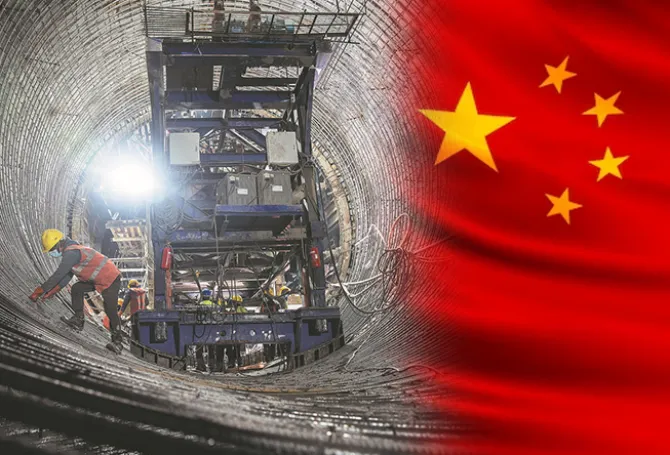-
CENTRES
Progammes & Centres
Location
Although China has initiated steps to improve its development cooperation programme, many of the commitments have yet to materialise

This is the 151st in the series–The China Chronicles.
China’s foreign assistance programme began in the 1950s, but the country was an aid recipient until 1999. The decade of the 2000s saw a drastic change in China’s global position as its development cooperation programme expanded rapidly and its state-owned enterprises increased their global footprint under the ‘go out’ policy. Within a short span of time, China became an important development partner for most southern countries, especially in the African region. The Chinese development cooperation programme provided an alternative and easy source of finance for several developing countries that were disappointed with Western conditionalities. Not only did China challenge Western dominance in the international development scene, but it also quickly emerged as the preeminent international financier and infrastructure provider for the developing world.
The Chinese development cooperation programme provided an alternative and easy source of finance for several developing countries that were disappointed with Western conditionalities.
However, China’s development cooperation programme was always contentious. It received severe criticism, particularly from Western quarters, and was often accused of neo-colonialism, being a rogue donor, and engaging in a policy of debt-trap diplomacy. Several of its infrastructure projects have also been mired in corruption scandals and have violated environmental and labour laws in recipient nations. While some of the criticism could be regarded as excessive or motivated, there were some serious problems with China’s approach, which China itself could not ignore any more. Several studies such as Bataineh, Bennon, and Fukuyam (2019), Russel and Berger (2019), Githaiga, Burimaso, Bing, and Ahmed (2019) found that Chinese soft loans for infrastructure were often extended haphazardly without proper due diligence, feasibility studies, and an overestimation of economic gains from projects. The problem that attracted the harshest criticism was corruption, kickbacks, and opacity of Chinese projects. Several recipient nations like Tanzania and Bangladesh also criticised China over the opacity of its loans. China’s internal reports have also found faults in the implementation of loan-financed development projects. According to a report by the Carnegie Endowment for International Peace, China’s Central Discipline Inspection Commission found instances of corruption in foreign projects. China has acknowledged that its development cooperation programme has become too large and complex, and requires greater and better monitoring. It initiated a series of changes in the institutional architecture of its development cooperation in the last few years. The two most important developments were the establishment of the China International Development Cooperation Agency (CIDCA) in 2018 and the release of the third white paper on Chinese foreign aid in 2021. The establishment of CIDCA was a turning point as it came at a time when some OECD (Organisation for Economic Cooperation and Development) countries like the United Kingdom (UK) and Australia abolished specialised aid agencies like the Department for International Development (DFID) and Australian Agency for International Development (AusAid). CIDCA was established with the aim of elevating the importance of Chinese foreign assistance, aligning its development assistance programme with its foreign policy goals, and improving the governance of Chinese development programmes.
China has acknowledged that its development cooperation programme has become too large and complex, and requires greater and better monitoring.
Before the establishment of CIDCA, the three ministries that played a dominant role in China’s aid governance structure were the Ministry of Commerce, Ministry of Foreign Affairs, and the Ministry of Finance. Over 20 line ministries were also involved based on the economic sector of the development project. There was hardly any information sharing between different ministries and bureaucratic feuds often led to poor project implementation. CIDCA replaced the Ministry of Commerce as the lead coordinator of Chinese development cooperation and now represents the Chinese government in negotiations and signs agreements in its name. Unlike the Ministry of Commerce, CIDCA is also tasked with the role of advising Chinese leaders on foreign aid and preparing country strategies. While CIDCA was established with much fanfare, the institution did not fully replace the powerful Ministry of Commerce. CIDCA’s status as a deputy ministry severely curtails its influence over the powerful ministries of commerce and foreign affairs. Its staff strength is also limited. Another major problem with China’s development cooperation approach was that it was completely led by the Chinese state and state agencies. There was no community touch, which often alienated the local population in recipient countries. Chinese NGOs felt that with the establishment of CIDCA, Chinese civil society organisations would play a larger and more important role in the country’s development partnerships. However, scholars Denghua Zhang and Hongbo Ji find that this has not materialised. Similarly, CIDCA’s limited staff strength and inadequate research capacity on development aid, development effectiveness, and implementation, impairs its advisory role.
The country has made some attempts at improving the governance structure of its foreign assistance programme and initiated steps to improve development effectiveness and transparency.
In 2021, China released its third white paper on foreign assistance. The white paper also emphasised aid effectiveness and transparency and stressed on clearly defined project management rules and competitive tendering processes. Further, to eliminate corruption, it recommended appraisal of project implementing agencies and regular impartial project evaluations. However, the seminal point in the white paper was the commitment to develop a modern statistical system to track foreign assistance and enhance supervision. For years, the Chinese state did not provide a detailed break-up of how its foreign assistance is disbursed to individual countries by type or purpose of assistance. The lack of reliable data hampered comparisons and often triggered suspicions. As a responsible power, China must improve the governance of its foreign assistance programme, enhance the quality of its projects, and respond to growing criticisms against its development programme in other countries. The country has made some attempts at improving the governance structure of its foreign assistance programme and initiated steps to improve development effectiveness and transparency. Several studies suggest that there hasn’t been a steady increase in Chinese foreign aid expenditure since 2015. Chinese agencies are now asking for better project feasibility studies and are less inclined towards supporting projects where the repayments come from the income stream generated from the project itself. However, not much has changed institutionally. CIDCA is much less powerful as a development agency due to its position as a deputy ministry and poor staff strength. The agency also lacks the research capacity to advise Chinese leaders and prepare country strategies for developing countries. Chinese state enterprises implementing projects in other developing countries also need to improve their operations dramatically. Many of the commitments made in China’s white paper on foreign assistance have also not materialised so far. In a nutshell, the country needs to walk the talk.
Malancha Chakrabarty is Senior Fellow and Deputy Director (Research) at the Observer Research Foundation
The views expressed above belong to the author(s). ORF research and analyses now available on Telegram! Click here to access our curated content — blogs, longforms and interviews.

Dr Malancha Chakrabarty is Senior Fellow and Deputy Director (Research) at the Observer Research Foundation where she coordinates the research centre Centre for New Economic ...
Read More +